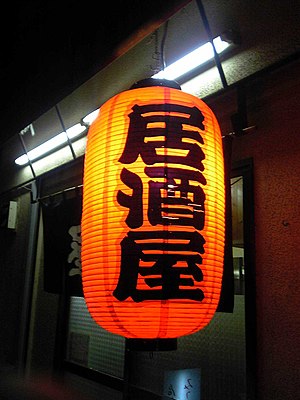 Image via Wikipedia Image via Wikipedia |
| Two lanterns like this one are in the window of Izakaya Don in Cliffside Park. |
I'm not sure what prompted me to have dinner on Saturday at a Japanese pub in Cliffside Park.
I had visited a Japanese friend who described herself as sad and depressed, even though she believes her relatives and friends weren't injured in the devastating earthquake and tsunami, and I had spent an hour or two watching the gut-wrenching television images from the island nation.
It's been years since I ate at the pub now called Izakaya Don. I had dinner at its Japanese-owned predecessor with Michael Thaler, a friend and co-worker who had spent three, transformational years in Japan, teaching English at a junior high. He died in early 2008.
I was the first customer late Saturday afternoon, and the owner was sitting at the sushi bar watching Japanese TV when I walked in. He directed me to a table with a specials menu written in English.
The pub has been operated by Don since July 2004, as you can tell from the colorful, framed 1st anniversary poster on the wall. The owner is an older man with a head of full, dark hair.
I didn't count the seats at tables and the bar, but I would be surprised if the place could hold more than two dozen customers. Tables are bare and the napkins are paper.
The waitress said Don is a Japanese name, and she wasn't aware that in English, a don is the head of a Mafia family.
 Image by Muy Yum via Flickr Image by Muy Yum via Flickr |
| Cooked eel sushi. |
I order two small plates and a bowl of buckwheat noodles in a delicious fish broth (hold the pork). To drink, I asked for a glass of sake, which was served overflowing into a small dish. And I finished my meal with green tea.
I started with three plump oysters that were beautifully fried and served with a lemon wedge, hot mustard and tartar sauce ($6.50).
Don-Udon, my noodle soup, included seaweed, finely minced white yam and wasabi ($9.50). I then had three pieces of cooked eel sushi ($2.75 each).
My overflowing glass of sake was $10.75. Next time, I might have a mug of cold beer, which I saw two Japanese customers drinking.
According to Wikipedia, the name "izakaya" is a compound word consisting of "i" (to sit) and "sakaya" (sake shop), showing that izakaya originates from sake shops that allowed customers to sit at the premises to drink.
Izakaya are sometimes called akachōchin (red lantern) in daily conversation, because these paper lanterns are traditionally found in front of an izakaya.
During my visit to Izakaya Don, I recalled how similar this form of eating and drinking is to the ouzeries in Greece, where you also get an overflowing glass of strong, clear liquor -- ouzo -- to go with your small plates of food, or the Middle Eastern mazza, which features appetizers accompanied by anise-flavored arak.
Izakaya Don, 671 Palisade Ave., Cliffside Park; 201-941-3400.

I went to Don's tonight. Had the sushi deluxe and grilled squid. Both were good, but I felt they were a bit pricey for the portions. It's a nice place, though, and I'll have to go back for the don-udon next time.
ReplyDeleteSpeaking of authentic Japanese places in the area, have you ever tried Hiura in Ft. Lee?
I agree with you about the price-portion imbalance at Izakaya Don, but it doesn't lack authenticity.
ReplyDeleteI know Hiura, and had a bento box lunch there a few months ago. I wrote about the restaurant in October 2004 in an article, "Outposts of Asia," for The Record.
The Hiura family once operated another Japanese restaurant in Fort Lee that served Chinese food and was a BYO, like the present one.
Today, The Record has a review of a Korean-owned izakaya, and you can also find drinks and small plates at Chef Ji's Moonjar in Fort Lee.
An untold stories is friction between the Japanese population of Fort Lee and nearby towns, and the more recent influx of Koreans, some of whom now own the buildings that house Japanese restaurants.
You have to wonder why Izakaya Don charges $9 for a relatively small bowl of udon or over $10 for small glass of sake. Do the owners have an unreasonably large rent to pay every month?
This sentence should have read:
ReplyDeleteAn untold story is friction between the Japanese population of Fort Lee and nearby towns, and the more recent influx of Koreans, some of whom now own the buildings that house Japanese restaurants.
I never knew about the friction. TBH I don't know many long-term Japanese residents in Bergen. I do remember attending school w. many Japanese students in the 80's. By the next decade most seemed to have moved back to Japan.
ReplyDeleteI am aware of tensions within the Korean community, though. There's the usual older generation-younger generation chasm that is the cause of many splits in several Korean churches.
I notice more Korean-Chinese in the area, also. And sadly they are not really embraced by the Korean-Korean community.
Korean-Chinese would be Korean families from China? I know Japan has many ethnic Koreans, but wasn't aware that China does, though that makes sense, too.
ReplyDeleteI've heard South Korea is one of the most congested or crowded places on Earth, which may be why so may Koreans leave.
I like to joke that Korean families flock to New Jersey, because they think Fort Lee and Palisades Park are towns established by the Lees and the Parks.